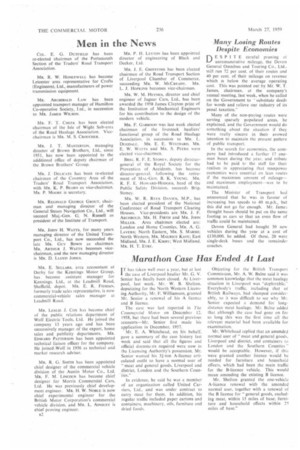Many Losing Routes Despite Economies
Page 36

If you've noticed an error in this article please click here to report it so we can fix it.
DESPITE careful pruning 01 unremunerative mileage, the Devon General Omnibus and Touring Co., Ltd., still run 72 per cent. of their routes and 40 per cent. of their mileage on revenue which is below the average operating cost. This was pointed out by Mr. W. T. James, chairman. at the company's annual meeting, last week, when he called on the Government to substitute deeds for words and relieve our industry of its penal taxation."
Many of the non-paying routes were serving sparsely populated areas, he explained, and the Government would do something about the situation if they were really sincere in their avowed intention to maintain the present pattern of public transport.
In the search for economies, the company had introduced a further 17 oneman buses during the year, and tribute had to be paid to the staff for their realism in appreciating that manpower economies were essential on lean routes if the maximum amount of mileage— and maximum employment—was to be maintained.
The Minister of Transport had announced that he was in favour of increasing bus speeds to 40 mph., but this did not go far enough. Mr. James thought buses should be put on the same footing as cars so that an even flow of traffic could be maintained.
Devon General had bought 30 new vehicles during the year at a cost of £130,000, he added. Of these, 20 were single-deck buses and the remainder coaches,




































































































